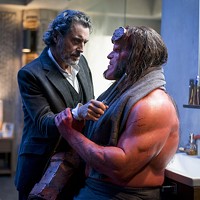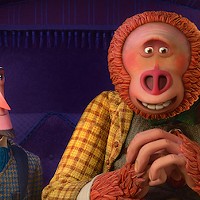

THE KILLING (1956). Stanley Kubrick's third film was the one that made Hollywood sit up and take notice. Adapting Lionel White's novel Clean Break and hiring Jim Thompson to write much of the dialogue, Kubrick put together a nifty film noir that, arriving six years after John Huston's The Asphalt Jungle and one year after Jules Dassin's Rififi, revealed the decade to be a potent period for the heist flick. Asphalt star Sterling Hayden again portrays a key figure in the caper; here, he's Johnny Clay, who assembles a group of desperate men — a cop (Ted de Corsia), a clerk (Elisha Cook Jr.), a bartender (Joe Sawyer) and a financier (Jay C. Flippen) — to rob the local racetrack of its vast proceeds. Johnny also hires two pros (Timothy Carey and Kola Kwariani, both stealing their brief scenes) to provide distractions during the heist, yet the seemingly foolproof plan is no match for the greed of the clerk's wife (Marie Windsor), who figures she and her lover (Vince Edwards) should be entitled to all of the money. With its mix of colorful characters, punchy dialogue and storyline told in nonlinear fashion, this proved to be a major influence on later filmmakers — the most obvious example is Quentin Tarantino, whose Pulp Fiction clearly drew much of its mojo from this crackling crime story.
Criterion's two-disc edition also includes a special treat: Kubrick's ultra-low-budget 1955 feature Killer's Kiss. Other extras include a 21-minute interview with The Killing producer James B. Harris; two 1984 interviews with Hayden (including one in which he admits his shameful actions during the '50s Hollywood blacklist) totalling 24 minutes; a 19-minute piece on Thompson; and a 9-minute featurette in which film critic Geoffrey O'Brien discusses Killer's Kiss.
Movie: ***1/2
Extras: ***
MYSTERY SCIENCE THEATER 3000: VOLUME XXI — MST3K VS. GAMERA (1991). The MST3K gang elected to use five of the 24 episodes from Season Three (Season Four if you count the unavailable Minneapolis-only episodes, but who would?) to showcase movies starring Japan's flying, flaming turtle-monster. Those five shows are collected here, and the result is a terrific box set that captures the series during a particularly fertile period. Gamera (originally released in 1965) is the film that introduced this Godzilla wanna-be to the masses, and the sequels shown on MST3K (there have been at least a half-dozen other Gamera titles beyond the ones targeted by Joel and the 'Bots) consist of Gamera vs. Barugon (1966), Gamera vs. Gaos (1967), Gamera vs. Guiron (1969) and Gamera vs. Zigra (1971). The nemeses that require Gamera to muster all his turtle power to defeat them are a strange lot, though my favorite has to be Guiron, whose Ginsu knife-shaped head allows him to slice and dice foes like so much salami. The riffs throughout the movies are hilarious — the films' plucky kid characters are endlessly ridiculed, and Joel, Crow and Servo manage to name-drop everyone and everything from Tom Wolfe and The Wizard of Oz to Petticoat Junction and Mannix — but it should be noted that the invention exchanges and the Satellite of Love segments are top-notch as well. For starters, Dr. Forrester and TV's Frank come up with Rorschach centerfolds to appease the Hannibal Lecters of the world, Crow and Servo tackle the Mac vs. PC argument, and the SOL crew reveal the interesting life of actor Richard Burton, including the fact that he was the original choice to play the Lee Majors role on the TV show The Fall Guy.
DVD extras include the 23-minute featurette So Happy Together: A Look Back at MST3K & Gamera; Gamera Obscura: A History, a 30-minute interview with author August Ragone; a 24-minute discussion with the visual effects wizards The Chiodo Brothers (Elf, Team America: World Police) about the effects seen in the Gamera films; and the original Japanese trailers for all five movies in the set.
Collection: ***1/2
Extras: ***
PRIEST (2011). Priest begins with some juicy exposition related through trippy anime (not surprising, considering the source material was a Korean graphic novel) before plunging into its story about a "Warrior Priest" (Paul Bettany) who sets out after the vampires who kidnapped his niece (Lily Collins). And for a while, the picture looks as if it might deliver on a palatable pulp-popcorn level: Director Scott Stewart keeps the proceedings moving at a breathless clip, Bettany's seething conviction as both a man of the cloth and a man of action is inspiring, and the obvious plot parallels to John Ford's The Searchers (seriously!) are a nice touch. Nicest of all, though, is the decision to initially keep the vampires out of sight, a throwback to the rule dictated by filmmakers Val Lewton and Jacques Tourneur that suspense is best maintained when the monsters exist in the mind rather than on the screen. However, this being 2011, we know we'll eventually see the vampires — which is fine ... until we actually see them. These creatures are, in a word, laughable. Created entirely through CGI — unconvincing CGI, I might add — they suggest the result of a threesome between Dracula, The Road Runner, and a slug. The exception is the "human vampire" called Black Hat (Karl Urban), who in the end turns out to be a stock movie villain, only with sharper teeth. After a strong beginning, Priest ends with a whiff of Jonah Hex about it. Keep searching.
Extras on the unrated Blu-ray edition include audio commentary by Bettany, co-star Maggie Q, Stewart and scripter Cory Goodman; picture-in-picture interviews; 13 minutes of deleted and extended scenes; a 13-minute behind-the-scenes piece; and an 11-minute featurette on the movie's weapons and vehicles.
Movie: **
Extras: **1/2


